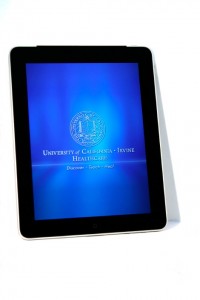The 104 first year medical students entering University of California Irvine School of Medicine [1] August 6 will be getting more than the traditional white coats that signify their entry into the medical community: Tucked into each coat’s pocket will be an iPad pre-loaded with everything necessary for the first year of course work.
“It’s no longer book-to-brain,” Dr. Gerald Maguire, senior associate dean of education, at UCI, told us. “The goal is more active learning.”
That goal includes fostering highly individualized and small-group learning for a richer medical school experience.
As part of its new iMedEd [2] Initiative, the medical school has developed a comprehensive, iPad-based curriculum, reinventing how medicine is taught in the 21st century and becoming the first in the nation to employ a completely digital, interactive learning environment for entering students. (We understand at least one other school of medicine – Stanford University School of Medicine [3] – will be doing something similar a few days after UCI. Ed.)
[2] Initiative, the medical school has developed a comprehensive, iPad-based curriculum, reinventing how medicine is taught in the 21st century and becoming the first in the nation to employ a completely digital, interactive learning environment for entering students. (We understand at least one other school of medicine – Stanford University School of Medicine [3] – will be doing something similar a few days after UCI. Ed.)
“We are committed to using evolving technology to benefit the education of our medical students,” said Dr. Ralph V. Clayman, dean of the UCI School of Medicine. “It is our firm belief that a digitally based curriculum will be the wave of the future, and UCI seeks to be a leader in the innovative presentation of information to students.”
Dr. Warren Wiechmann, the school’s director of instructional technologies, says that the iMedEd Initiative calls for eliminating the classic lecturer-passive listener model and putting everything students need to succeed in class at their fingertips.
The wireless, 16-gigabyte, 3G iPad is loaded with lectures, essential first-year textbooks in a digital format that allows highlighting and notation, lecture notes, a searchable database. It features hundreds of medical applications; note-taking and recording capabilities; and many other tools to complement various learning styles. Students will be able to view short, topical lectures via podcast prior to meeting for small-group discussion. Not only do archived lectures make better use of faculty members’ time, they will also facilitate interactive and self-directed learning.
“Everything is integrated,” says Maguire, who says that this will give students more time with patients, and there will be no worries about missing lectures. Additional content includes diagrams, course outlines and handouts, and slide presentations. Students will have access to audio and video libraries as well as podcasts. And technological advances such as digital stethoscopes and handheld ultrasound units are currently being configured.
“The timing is right,” says Wiechmann. “Students are coming to us from top-tier schools where podcast and small-group learning is the norm for undergraduates, but most medical schools still teach in the traditional way,”
An example of the technology’s myriad of interactive learning possibilities: An on-call neurosurgeon – regardless of location – could craft a 30-minute lecture via a webcam for students to watch online. They could review it as often as necessary and consult supplemental materials, including step-by-step videos, to clarify the lesson. When students meet with the neurosurgeon in an office, classroom or hospital setting, they can focus on specific cases to further augment the learning experience.
“Such innovation is merely the tip of the iceberg,” says Clayman. “In the future, physicians will literally carry a library’s worth of information on a tablet computer in the pocket of their white coat or suit jacket. The age of electronic medicine is upon us, and both patient and practitioner will benefit. UCI’s iMedEd curriculum is a step in that direction.”
The iPads have lots of empty space for additional data to be added, and a lot more information will be web-based on the server.
While this is considered a pilot project available only to students in their first year of the four year program, Maguire says that UCI is already looking at doing the same for year two and beyond. All the educational faculty at the school had input into year one.
And with the rush to take notes on everything considerably reduced, Maguire agrees that maybe the handwriting of doctors of the future will be more legible!